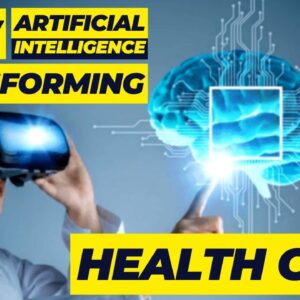The healthcare industry is rapidly evolving, and one of the biggest drivers of this change is the increasing integration of artificial intelligence (AI) in healthcare practices. From predicting disease outcomes to streamlining administrative tasks, AI has the potential to transform the industry in remarkable ways. In this blog post, we will explore the impact of AI on healthcare and provide tips for reshaping the industry through the integration of this innovative technology.
Introduction
The healthcare industry has been impacted by various technological advancements. One of the most significant in recent times is the use of Artificial Intelligence (AI). AI has become an essential tool in transforming the healthcare industry in several ways by improving patient outcomes and processes, reducing costs, and increasing efficiency. This article will explore the impact of AI on healthcare and provide tips on how it can reshape the industry.
Impact of Artificial Intelligence (AI) on Healthcare
- Improved Diagnosis and Patient Outcomes: AI has the ability to analyze vast amounts of patient data that can assist healthcare professionals in diagnosing diseases accurately and in a timely manner. This will enable healthcare professionals to provide more personalized, effective care to patients.
- Drug Discovery and Development: AI has the potential to accelerate drug discovery and development processes. It can analyze genetic data, predict efficacy, and side effects of potential new drugs before human trials, thereby reducing the cost and time it takes to bring a new drug to market.
- Predictive Analytics and Prevention: AI can help predict patient outcomes, enabling medical professionals to anticipate and prevent adverse events. It can also identify patients at high risk of developing serious illnesses such as heart disease, allowing for early intervention and prevention.
- Optimization of Healthcare Operations: By using AI, healthcare providers can optimize resource utilization, reduce wait times, and improve efficiency. It can also automate tasks such as scheduling appointments, reminders, and billing, freeing up time for healthcare professionals to concentrate on patient care.
Tips for Reshaping the Healthcare Industry using AI
- Develop an AI Strategy: Healthcare providers should develop a comprehensive AI strategy that aligns with their organizational goals. This should include identifying the AI tools and technologies needed, assessing their effectiveness and cost-benefit, and evaluating the ethical implications of AI in healthcare.
- Invest in AI Talent: Healthcare providers should invest in AI talent, including data scientists, machine learning experts, and software engineers. These experts can work with healthcare professionals to develop AI models, optimize existing systems, and analyze data to improve patient outcomes.
- Engage Patients and Healthcare Professionals in AI Adoption: Patients and healthcare professionals must understand the benefits and limitations of AI. There is a need to engage them in the adoption of these technologies in order to build trust and acceptance and encourage usage.
- Focus on Data Security and Ethical Considerations: Healthcare providers should take measures to protect patient data and privacy while also considering ethical considerations related to AI, such as fairness, transparency, and accountability.
- Monitor and Evaluate Performance: Healthcare providers should monitor and evaluate the performance of AI systems continually. This includes determining its effectiveness, accuracy, and efficiency, as well as assessing any unintended consequences or biases that may arise.
Conclusion
The healthcare industry is undergoing rapid transformation due to the adoption of AI. It has the potential to improve patient care, increase efficiency, and reduce costs. With careful planning, investment in talent, and a focus on data security and ethical considerations, healthcare providers can successfully adopt AI and reshape the industry.
FAQs After The Conclusion
- What is the role of AI in healthcare?
- What benefits does AI offer to the healthcare industry?
- What are the ethical considerations of using AI in healthcare?
- How can healthcare providers encourage patient and healthcare professional acceptance of AI in healthcare?
- How can healthcare providers ensure the accuracy and effectiveness of AI systems in healthcare?
